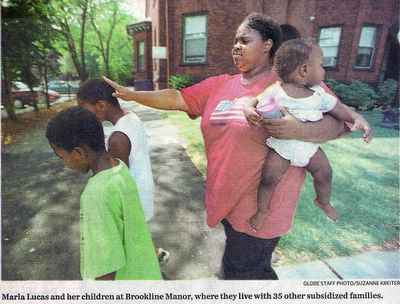
By David Abel | Globe Staff | 6/10/2003
After years of turning people away because there weren't enough affordable apartments, the state has started turning them away because there are too many applicants.
Earlier this year, for the first time in the history of Massachusetts' Section 8 rental-assistance program, the state ran out of vouchers that provide federal subsidies to low-income tenants. The federal government, which is in the process of reforming the Section 8 system, refused to issue any more vouchers, leaving the state to tell people like Eliana and Daniel Rivera - who had already waited nearly a year for the subsidy - that their wait would now be indefinite.
"I cried a lot after hearing it would take so long," said Eliana Rivera, 25, who had been told she was only weeks away from receiving a voucher worth 70 percent of her monthly rent.
For years, Massachusetts couldn't use its allocation of vouchers because the real estate market was so hot that few landlords were willing to bother with Section 8 tenants. In the last six months, though, the softening market has dramatically increased the number of landlords willing to rent to those tenants, pushing up the use of the vouchers.
Governor Mitt Romney recently asked the federal government for 1,800 more vouchers to add to the 19,487 now in use in Massachusetts. But Congress earlier this year prohibited extra vouchers for housing authorities that have used up their allocation.
"By law, there's nothing more we can do" for Massachusetts right now, said Jerry Brown, a spokesman for the Department of Housing and Urban Development, which oversees the voucher program.
Meanwhile, the Bush administration is trying to transform the housing subsidies from grants aimed at individuals into a lump sum to states. Mel Martinez, the US secretary of housing, told Congress earlier this year that after three years of adding vouchers - 210,000 since 1999 - the government needs to focus on reducing the number of unused ones, which in the past two years amounted to about $2.4 billion in subsidies.
"Allocation of the funds to the states should allow for more coordinated efforts," Martinez told the House Appropriations Committee in March. For fiscal 2004, the administration has proposed spending $1 billion more than the $13 billion it spent this year on Section 8, adding 5,500 vouchers for people with disabilities.
State officials argue that the proposed changes to the 27-year-old federal program would end up costing the states more money - and ultimately reduce the number of vouchers. Not only would each state have to spend money administering the program, but they argue that a lump sum, instead of a specific number of vouchers, won't go as far when rents climb.
"The numbers just don't add up," said Beth Bresnahan, a spokeswoman for the Massachusetts Department of Housing and Community Development. "The cost of our housing far exceeds the national cost-of-living increases provided by block grants."
Local housing advocates are concerned about the proposed changes, saying that during tough economic times, the administration should be dramatically adding to the stock of vouchers - and leaving alone a program that is the only line of protection for thousands of Massachusetts families.
With a near-record 35,000 applicants already on the state's waiting list, state officials and housing advocates worry the backlog will significantly drive up the number of homeless families.
"Given that 75 percent of all homeless families exit our shelters with a subsidy, this freeze on Section 8 subsidies causes tremendous concern," said John Wagner, commissioner of the Department of Transitional Assistance, which oversees state homeless programs.
Homelessness is a growing worry for the Riveras, who lost their clerical jobs at New England Medical Center last year, and since then have moved in to his mother's crowded house, then to a state-subsidized motel, to a family shelter, and most recently to a temporary apartment.
Like the Riveras, Danielle Echevarria, a 20-year-old single mother who had already waited three years for a Section 8 voucher, believed she was only a few weeks away from getting one when she heard the program had been frozen. Now, she doesn't know what she's going to do.
Echevarria has been living in a small room in her grandmother's house for a while. But now, her grandmother wants her and her 3-year-old son to move out, Echevarria said - and her only option will be a homeless shelter.
"All I can say," she said, "is I'm very desperate."
David Abel can be reached at dabel@globe.com. Follow him on Twitter @davabel.
Copyright, The Boston Globe

